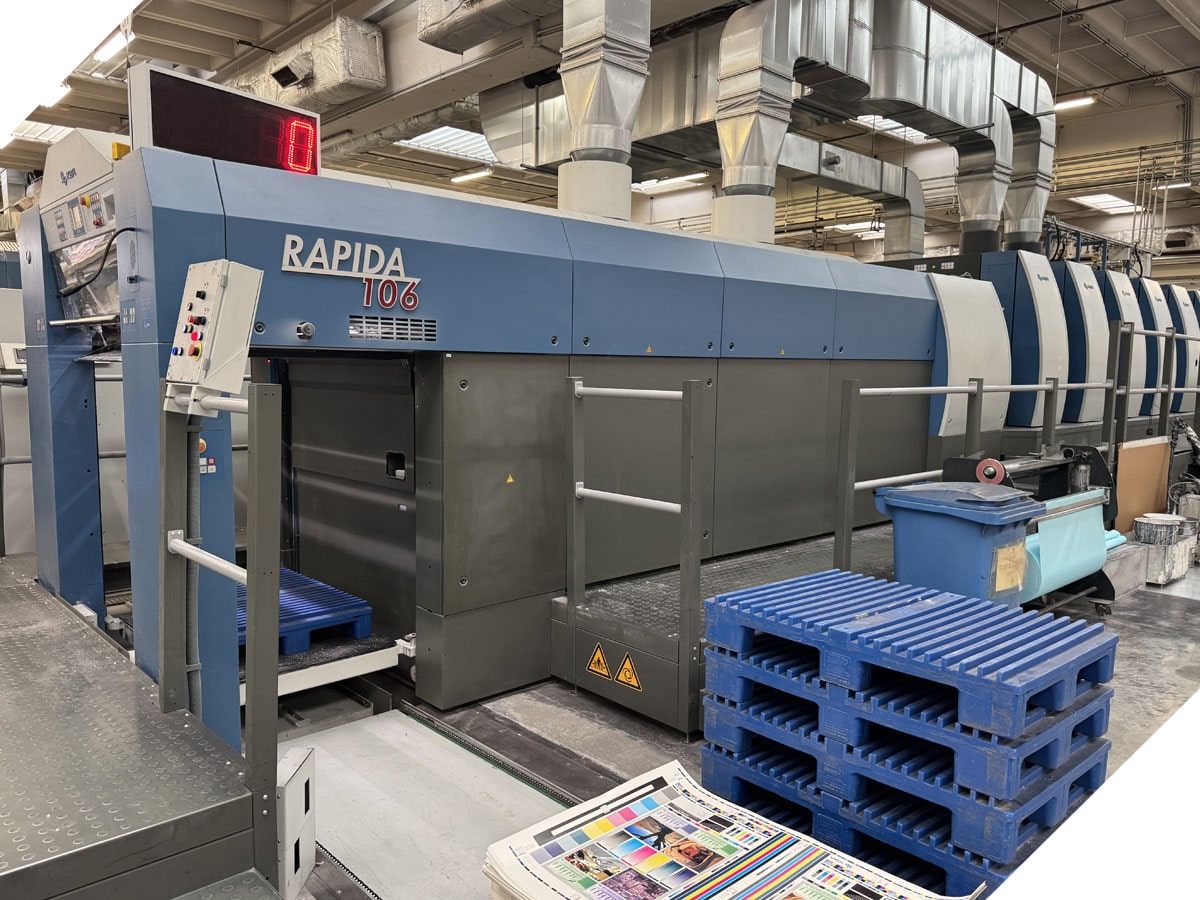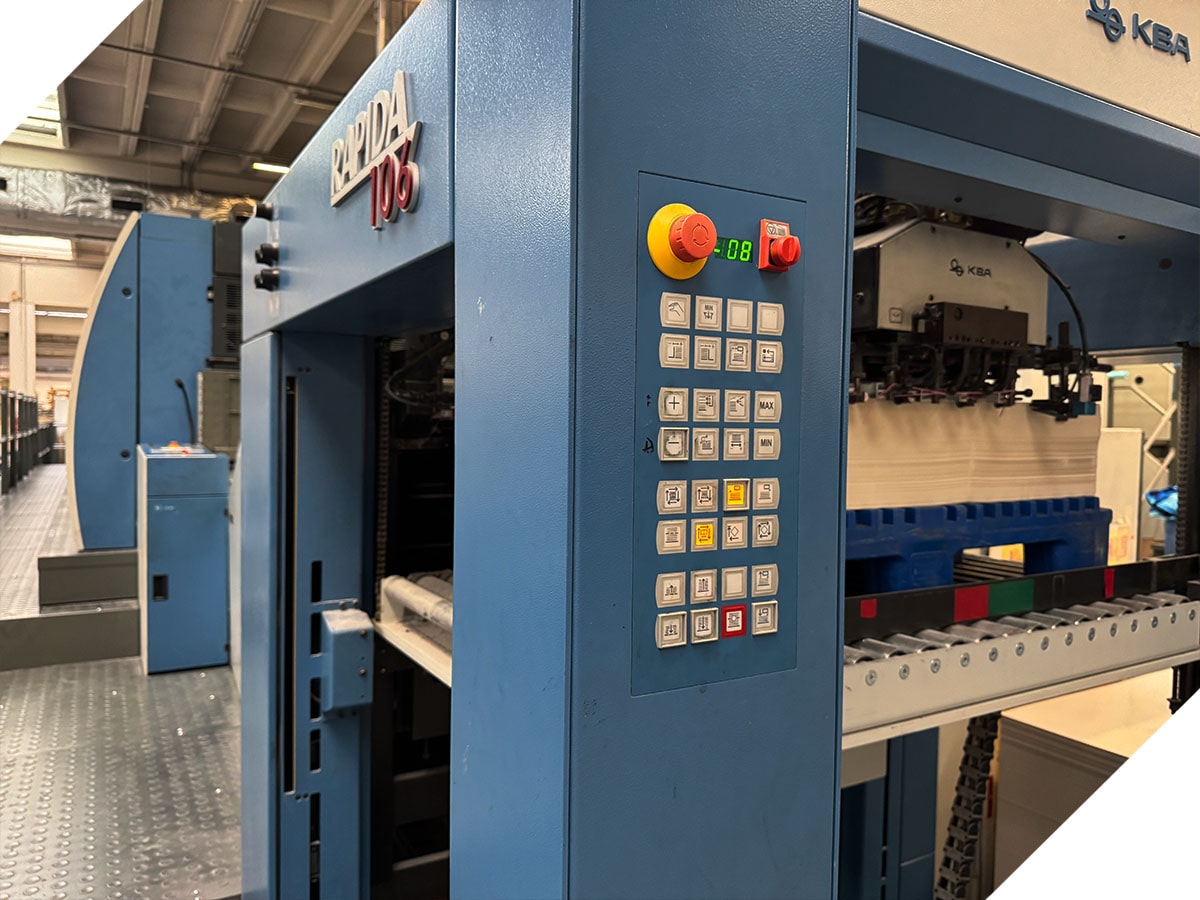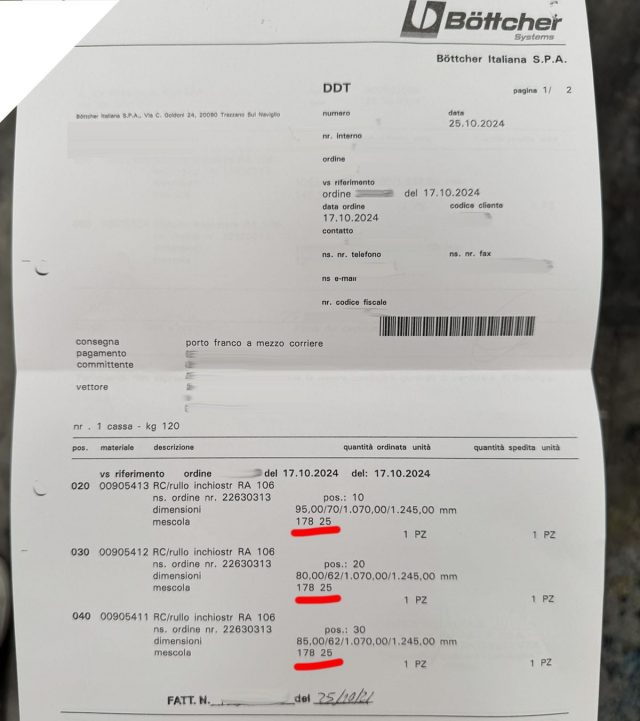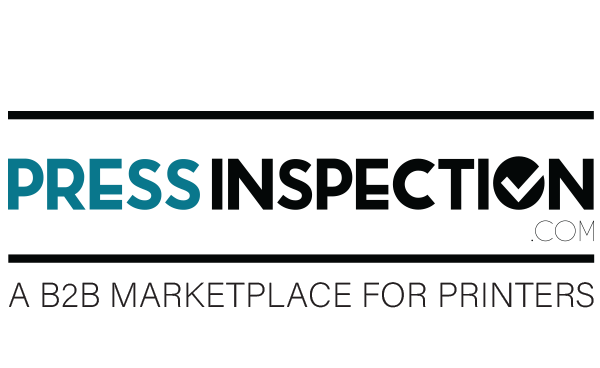A real case from recent practice.
Our ‘PressInspection’ team was approached by a client from the Arab Emirates who asked us to inspect a KBA Rapida 106-7-LTTL printing machine to check its technical condition. The equipment was installed in a respected printing company which is specialized on package. It has been in the same place for the whole period of its operation. According to the manufacturer’s specification, the machine is equipped with both intermediate dryers for UV ink fixing and IR + UV modules for final drying after varnishing units.
 The principal requirement of the customer is that the machine to be purchased should be able to print on different inks: both conventional oil and UV inks. The thorough inspection ordered in our company was to demonstrate not only the compliance of the machine with the delivery specification, but also its ability to print with different types of inks. Especially since the delivery contract between the seller and the buyer clearly stated that the machine was equipped with hybrid printing rollers.
The principal requirement of the customer is that the machine to be purchased should be able to print on different inks: both conventional oil and UV inks. The thorough inspection ordered in our company was to demonstrate not only the compliance of the machine with the delivery specification, but also its ability to print with different types of inks. Especially since the delivery contract between the seller and the buyer clearly stated that the machine was equipped with hybrid printing rollers.
But the problems started long before the inspection was organised.
The seller was in a great hurry to have the machine inspected by the customer. And in order for the machine to be reserved, the customer signed a contract and made an advance payment.
 We prepared a special file in seven colours, which was planned to be printed on paper of 115 grams per square metre and sent the test to the print shop.
We prepared a special file in seven colours, which was planned to be printed on paper of 115 grams per square metre and sent the test to the print shop.
The printing house refused all our conditions, referring to the fact that they do not have paper of such density (it is a packaging printing house). In addition, it suddenly turned out that the printing house does not work on UV inks either. They don’t have it!
To the question ‘why so’, we received a rather reasonable answer. They say that we work with food packaging that has direct contact with food, and therefore we refused to use harmful technologies. But then the following questions arise: why did they buy a hybrid machine with UV dryers? It is much more expensive.
And the main question was: what rollers are currently installed on the machine?
The printing company claimed: no, no, all the rollers were still hybrid, and they could print with UV inks at any time. But this fact is not reflected in their contract with the supplier. Who will be responsible for additional expenses?
We were only provided with a printout of the factory order file of the printing machine from the KBA factory, which clearly stated that the machine was equipped with hybrid rollers. The machine was bought by a dealer according to the factory specification. The fact of evidence of hybrid rollers was also confirmed in words by the printing house.
Why is this important?
The binding agent of UV inks is incompatible with the rubber of conventional printing rollers. If abrasive inks are applied to conventional rollers, they can quickly swell and fail.
UV rollers are slightly more expensive, but they do not work with conventional inks.
Hybrid rollers can work with both conventional and UV inks. But the cost of a set of hybrid rollers is about 2 times higher than the rollers for conventional printing. Thus, a machine buyer would have to invest more than 50 thousand euros to purchase seven new sets of rollers.
How to identify the rollers?
We offered to deliver our own UV inks and try to print the test with them. But the printer flatly refused. Firstly, unlike many other countries, in Italy it is customary to pay for the test printing time and consumables. The printer said it would entail a full wash-up process and preparation of the machine. Secondly, they don’t have people capable of working on UV inks and we need to order a printer from KBA from Germany. Thirdly, they can’t stop the machine for long. “See what we have and take our word for it!”
This is not the case when we can take their word for it. The price of the question is fifty thousand euros. We could not make a mistake.
What to do in this case?
Visually, it is impossible to distinguish hybrid rollers from conventional ones. Regular rollers are slightly softer (25 units on the Shore scale versus 35 for hybrid rollers). But after a few weeks of use, this is no longer distinguishable.
The technologist showed some old rollers in boxes that were probably brought in when the machine itself was purchased. The boxes were labelled, but it nothing said about the reality. The label looked very old. So the machine is equipped with hybrid rollers after all?
 But then our service engineer came up with an idea – we asked the printer to show us the invoice for the recent purchase of printing rollers. In theory, no one would mix hybrid rollers with conventional rollers. Even if there are at least a few conventional rollers in the printing group, the whole group will no longer be capable of running UV inks.
But then our service engineer came up with an idea – we asked the printer to show us the invoice for the recent purchase of printing rollers. In theory, no one would mix hybrid rollers with conventional rollers. Even if there are at least a few conventional rollers in the printing group, the whole group will no longer be capable of running UV inks.
The printer, unsuspecting, brought us this invoice. After decoding the codes together with Boettcher, we got a disappointing result: the printer lied.
The rubber composition number 178 025 corresponds to the composition for conventional oil-based inks. Therefore, there are no hybrid print rollers in the machine. It is impossible to work with UV colours without replacing all the rollers.
This is a case where a negative result is also an important result.
Be careful when signing the contract!
The delivery contract has been signed and the advance payment has already been transferred. Based on our PressInspection technical report, the customer managed to prove to his supplier that the machine MUST be equipped with hybrid rollers for universal printing. To which the supplier reluctantly agreed.
The conclusions from this story are obvious. But we repeat it again.
1. Had the customer not ordered a report from Pressinspection.com and taken the printer’s word for it, he would have had to invest an unplanned fifty thousand euros in buying seven new sets of rollers.
2. If the dealer had ordered our detailed report when buying the machine from the printer, he would not have made a mistake in the contract specification and would have earned fifty thousand euros more.
3. If the dealer had not rushed the customer to sign the delivery contract before the inspection, he would not have been obliged to retrofit the machine with expensive rollers.
4. Never take anyone’s word for it: everyone pursues their own interests. Before you pay for the machine, order our written report. This will help you find the truth even if the machine arrives at your production facility without any components.
We know much about printing presses. Our company can help you expertly choose a used printing machine, and not to make mistakes before buying.



